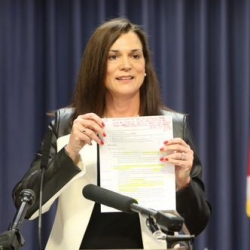State Representative Dana Young’s gambling industry legislation is set for its first official review on Thursday, March 26. The review of Florida House Bill 1233 is set for a special workshop is an initial meeting, with no votes made and no amendments proposed. Rep. Young said that attending House members only will discuss whether the bill is good for the state’s economy and its residents.
House Bill 1233 is a comprehensive framework for the future of Florida gambling. If the bill is signed into law, it would establish two Las Vegas-style, integrated casinos in South Florida. The developers of the South Florida casino projects would be requires to invest at least $2 billion in their projects. Also, the new casinos would have to contribute a total of $350 million to Florida’s treasury each year, once the casinos begin operations.
Lowering Taxes on Racinos
The racinos in the state would get significant tax relief. The seven racetrack-casinos (“racinos”) located in Southern Florida would see their tax rate go from 35% to 25%, instead.
Legislation also would exempt the dog tracks from offering live racing. In short, they would become pure slots casinos, because they will be able to operate slot machines without the burden of a dog racing schedule.
In recent years, dog racing has become an afterthought at the racinos. Gambling on the dog races has tapered off, while the revenues from the gaming machines has increased steadily. That has led track owners to push for an end to the provisions which require dog racing, because it is a cost-of-operation that could best be dispensed with.
If enacted, then the racetracks would have taken a backdoor path to become slot machine venues only. The dog racing industry of the state might fall by the wayside.
State Gaming Commission
House Bill 1233 also would establish a Florida Gaming Commission to oversee both new and old operations. The commission would have broad powers over the state’s gambling industry, including all gaming–though the lottery might be given an exeption.
Dana Young’s plan is likely to spark criticism. She says that the plan was not to please all interested parties, but to present “alternative visions” for the future of Florida’s gambling industry. By creating alternatives, it’s sure to cause significant debate.
Seminole Tribe Opposes HB 1233
The Seminole Tribe is a major opponent of the new bill. For the past 5 years, the Seminoles have had exclusive rights to operate blackjack in the state. That monopoly is set to expire on June 31, 2015.
Dana Young’s bill does not contain a reference to the Seminoles. It has been speculated that the exclusion of the Seminole Tribe is a bargaining position, because the state and tribe are currently negotiating a new plan. The inclusion of Las Vegas Sands and Genting Limited (two proposed casino owners) would end the blackjack monopoly, while providing stiff new competition for the state’s tribal gaming interests. The money generated by private gaming interests is likely to be significantly more than the Seminoles could provide alone, so the historical exclusivity the tribe has enjoyed is likely to be a thing of the past, under any plan.
Jim Allen, the CEO of Seminole Gaming, says that the state will lose money if the new bill is signed into law. Mr. Allen, whose company manages the Seminole casinos in Brighton, Hollywood, and Tampa, cites the lower taxes on the racinos. The lesser revenues from the dog racing industry is expected to be far outstripped by the money generated by the South Florida integrated resorts, though.
Disney Concerns Waning?
Walt Disney Corporation is a traditional opponent of gambling, but its position might be softening. It was announced last week that Disney is on the verge of a billion-dollar deal with DraftKings, an online daily fantasy sports website. While daily fantasy sports is legal in the United States, most people view the DFS as a form of gambling. With such a deal in place, it would be hard for Disney to take a hardline stance against casino gambling.

